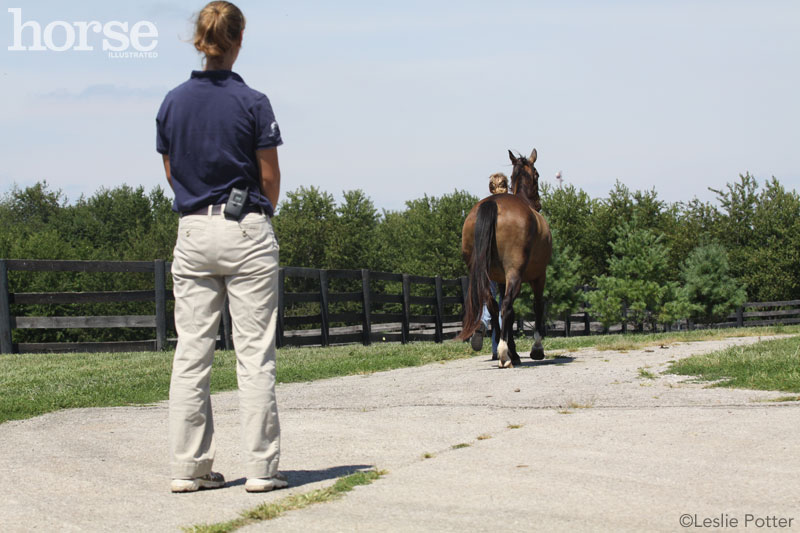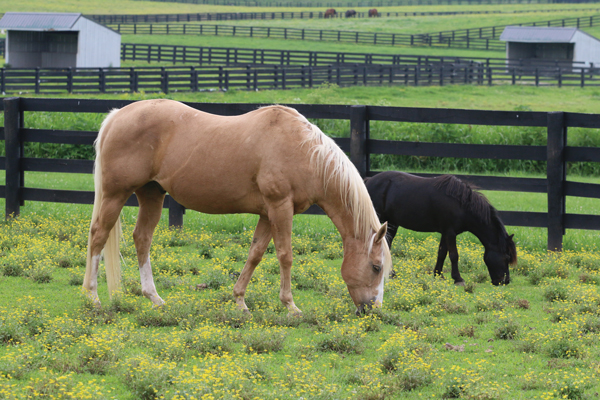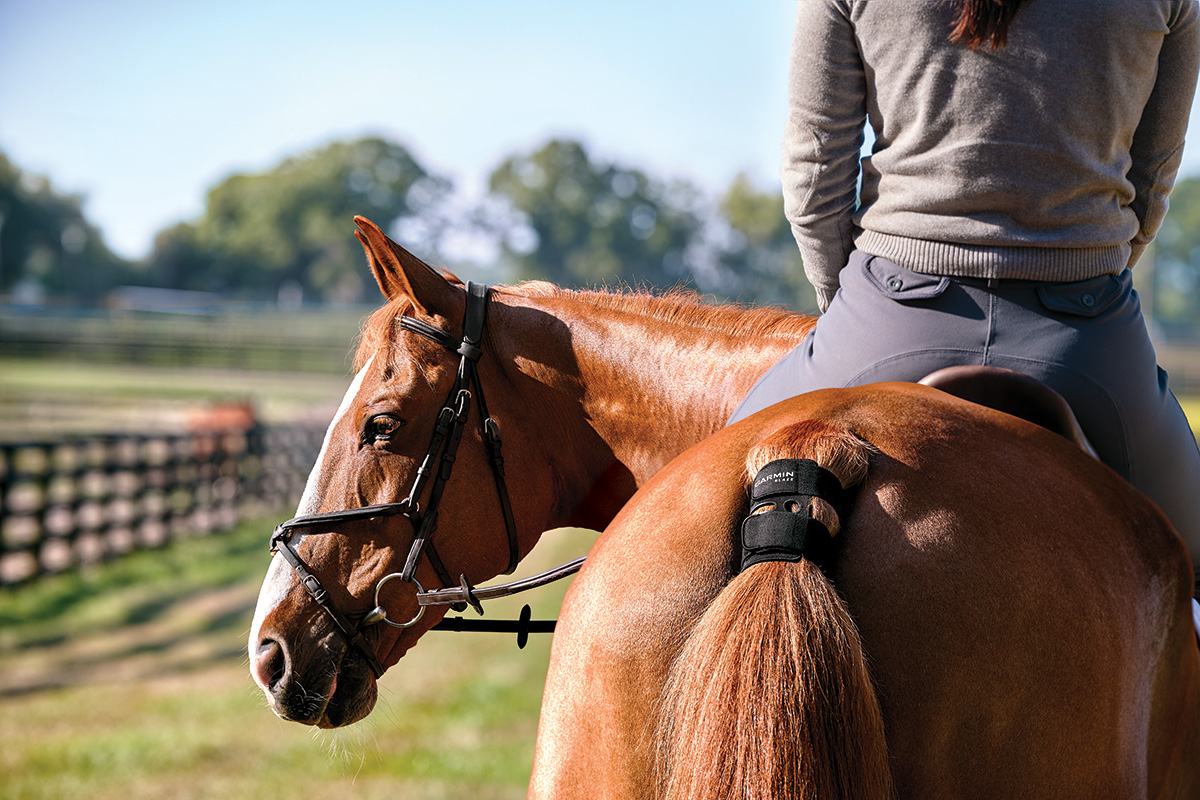
Know Your Worms
Tom Kennedy, DVM, vice president of new product development for Farnam Companies Inc., says that modern products available over the counter have made deworming seem very easy, when in fact it really isn’t. And many people don’t understand how to use these products correctly. “Before the advent of oral paste and feed preparations of dewormers, veterinarians were almost always the sole source of anthelmintic compounds. Today’s ease of use has placed the burden of determining when to use a product on the caregiver of the animal,” he says.
If the burden is on us, it’s important that we understand how to use these products in the best way, and how to help the chemicals do their jobs. “Parasite control programs are like vaccination programs in that a ‘one size fits all’ is probably not the best approach,” says Craig Barnett, DVM, senior technical service veterinarian from Intervet. “Ideally, each farm, with the assistance of a veterinarian, should develop a deworming program tailored to its needs.” A strategy that tackles parasites specific to the horses on that particular farm is the best option.
Sounds good. So where do we begin?
Facility Assessment
The first step is to consider your facility and its uses. Are your animals kept in stalls or out in pastures? If you have pastures, are they large enough to support all your horses? Do they graze in one pasture all the time? Do you rotate pastures? “A basic inventory of your animals and facilities, and an honest assessment of your common practices will go a long way to defining when and how to deworm your animals,” Dr. Kennedy says. For example, horses kept on large properties won’t have as big a parasite issue as horses crowded onto small acreage.
“Grazing is a big issue,” agrees John Donecker, DVM, senior veterinarian for Pfizer Equine. “Many people have a few horses in their backyard, and there’s not enough ground for each horse to move away from his manure. Each horse will be re-contaminating himself with every bite of grass.”
Grazing next to fecal matter is not normal equine behavior. Horses kept in adequate pasture space will defecate in one section and graze in another. If you limit that space this careful sectioning off of manure and grazing will stop. If your pastures are overgrazed, and additional land is not an option, you’ll have to employ a more aggressive parasite control program.
If you live in an area where pastures are a fond childhood memory rather than your dry lot reality, you still need to deworm. Depending on the situation, horses can still be contaminated if fecal piles are not picked up regularly.
Next, make up an inventory of the horses on your property, noting their age and current health. Not all age groups should be treated alike. Foals, pregnant and nursing mares and older horses have different needs than adult horses. Foals, for example, need to be treated more frequently for roundworms—every 45 to 60 days until about 9 months old, and then every 60 to 90 days. Horses that have health problems, such as chronic colic, may also have underlying parasite issues that need to be addressed in a different way. Knowing your herd and your facility will help in customizing your deworming program.
A Veterinarian’s Assistance
Learn More Pfizer Animal Health: www.pfizer.com/equine |
Your veterinarian should play a key role in your deworming regimen. This is because he or she is familiar with equine parasites and understands their life cycles, their prevalence in your area and when they are most vulnerable to dewormers. Your vet can also advise you on what class of chemical works best for your herd and your needs. “In addition he or she may advise you on other ways to optimize parasite control, such as manure disposal, feeding practices, pasture rotation and isolation of new horses,” Dr. Barnett says. Also, some species of worms, such as tapeworms, require specialized tests to identify their presence. Some horses carry encysted small strongyles within the intestinal tract for years, but may not have eggs in their feces.
It is possible to devise your own deworming program without your vet, but it requires some study and a working knowledge of worm biology. Many of the companies that market deworming products work hard to educate horse owners through CD ROMs, informative brochures and wall charts, which help consumers choose the right dewormer for their needs, but there is only so much these materials can do. “One should never forget that we are introducing a chemical into the animal,” Dr. Kennedy says. “So the use and the dose must be thought through. The most common problem with the application of anthelmintics to horses is either inappropriate timing or not administering the products often enough.”
Parasite Testing
The next step will be to identify which parasites are on your farm and if your current deworming program is working, says Val Williams, DVM, technical consultant for Fort Dodge Animal Health. “This is best determined by using fecal counts,” Dr. Williams says. “This is especially important today, as resistance to some of the commonly used dewormers is emerging. Fecal evaluation is critical in identifying the problems on the farm and assessing whether the current program works.”
The first fecal egg count test is conducted, usually by your veterinarian, prior to deworming to assess the number of eggs of each parasite per gram of feces. Testing is repeated two weeks after deworming—referred to as a fecal egg count reduction test (FECRT)—to assess how well your choice of chemical class has worked. The number of eggs per gram in the second test should be at least 90 percent less than the first. If reduction is less than 80 percent, there is definite resistance to the chemical class. If the reduction is between 80 and 90 percent, then resistance is considered suspicious. Be sure to stress to your veterinarian that you want a fecal egg count test, followed by a FECRT, and not a fecal flotation test. “Fecal flotation tests, commonly done with dogs and cats, are of minor use and insignificant in the horse,” Dr. Donecker says.
It’s important to note that fecal egg counts will not give an accurate count of adult parasites present in your horse and therefore aren’t a perfect assessment of his parasite burden. However, fecal egg counts are still important tests, and are the only way to monitor how well a chemical class is working and to identify high egg shedders in your herd.
Ideally, each horse on the farm should be tested at the same time, but this may be difficult to do in large herds. In this case, Frank Hurtig, DVM, associate director of Equine Veterinary Medical Affairs for Merial, suggests taking a sample of 10 percent of your herd. “Sample the same animals every time you do the test,” he says. Once you’ve repeated this test for each of the three chemical classes (see “Rotating Classes” sidebar pg. 61) you should have a general idea of what works on your property and what does not. “Hereafter, running this test once per year should be adequate if there are no concerns,” Dr. Hurtig says.
Testing each horse will also help identify the high egg shedders (as mentioned earlier) in your facility; these animals will need more aggressive care to control parasites. “We know now that if you have a herd of horses, a few of those, based on chance, are going to have a high output of parasite eggs,” Dr. Donecker says. “Those horses will produce 80 percent of eggs for the entire herd. They don’t exhibit sickness, but they allow the parasites to spew out lots and lots of eggs.”
Good Horsekeeping
Dr. Barnett says good horsekeeping practices are critical and can have a very positive effect on a parasite control program. “Remember, one of the primary objectives of a parasite control program is decreasing contamination of the environment with eggs and larvae,” he says.
Since most parasites make their entrance into the world via manure, managing muck is one of the best things you can do to keep your parasite load down. Pick out your stalls once a day or more if you have an animal that has a habit of eating manure.
Pick manure out of paddocks once a week, and if possible from the pastures, too. You’ll need to clean smaller paddocks or pastures more often. “This can be difficult and time consuming,” says Jenifer Nadeau, DVM, professor and equine extension specialist from the University of Connecticut. “Frequent mowing and chain harrowing during dry weather can help break the manure piles up and dry the parasites in the sun.” Do not drag or harrow pastures that are currently occupied by horses. The sun won’t have enough time to kill the parasites, and you’ll only be giving the worms a free ride toward hungry equine mouths. Also avoid spreading muck during mild, wet weather conditions because you’ll end up spreading larvae during their optimal conditions for survival.
All manure collected should be composted for several weeks in order to kill eggs and infective larvae before being spread on pastures. The center of the compost pile should be 130 to 140 degrees, which will even kill tough roundworm eggs. The pile will heat up naturally, and you can purchase a thermometer at garden centers that can be inserted into the center of the pile. Your local extension specialist can also assist you in how to correctly manage your compost heap.
Grazing cattle alongside horses can also help keep parasite loads down. “Cattle will graze down the grass evenly and in the process ingest the infective stage of horse parasites, which will have no effect on the cows,” Dr. Donecker says. You can also rotate your pastures with cattle, and even sheep, as parasites are species specific, and worms from these animals will not affect horses. Cows and sheep will also eat plants and grasses that horses shun.
If species rotation is not feasible, then rotate your pastures completely, leaving one vacant for three to four months, especially during hot, dry conditions when larvae are less likely to survive. Don’t shorten this time during the winter. “Contrary to popular belief, larvae can survive for long periods of time on pastures during winter months,” Dr. Barnett says.
Dr. Nadeau suggests limiting the number of horses on one piece of land. “Clean the pasture more often if this isn’t an option,” she says. “You can also consider sectioning off the pasture and leaving one area to rest for at least 30 days, which may help reduce a buildup of parasites.”
Getting Everyone On Board
It is very important for all horses at the same facility to be on the same deworming program since parasite control is based on herd prevention and pasture control, not on individual control. “It does no good to have one horse on a consistent program if the horse next door is repopulating the pasture and subsequently the other horses,” Dr. Williams says.
If you keep your horse at a boarding facility, there are ways to get everyone on the same program. Approach your barn manager and have a chat about implementing a program. One way is to have your veterinarian hold a deworming clinic at the facility, so all the boarders and the manager can be educated and inspired to work toward the same goal. “The barn manager can then implement a program where everyone is on the same schedule, and fecal counts are tested at regular intervals,”Dr. Williams says.
If fecal egg count tests are not practical and you are not able to identify high egg shedders, then deworming all adult horses at the same time is another option. This helps increase the efficiency of your deworming program and makes it more cost effective by reducing egg and larvae populations, which limits re-infestation of horses Dr. Barnett says.
However, if you’re at a boarding facility where it’s every man for himself and your next-door neighbor holds firm beliefs in ancient remedies, you may have to go it alone. In this case, rather than getting into a conflict with other boarders, you can safeguard your horse by deworming him with a broad spectrum dewormer combo that includes ivermectin plus praziquantel for tapeworm control and then putting him on the daily dewormer pyrantel tartrate. “The presence of the daily dewormer kills many of the infective larvae that the horses get when they graze in the grass next to a horse that is shedding lots of eggs because he isn’t getting dewormed properly,” Dr. Donecker says.
Dr. Williams warns that in his opinion there is controversy over daily dewormers and resistance, so consult your veterinarian before implementing this program. Dr. Donecker says, “In our experience at Pfizer Animal Health, when following tens of thousands of horses that are members of our PreventiCare Program during the past nine years, resistance has not been a problem when directions are followed.”
New horses in your facility should be treated with a broad-spectrum (ivermectin or moxidectin) dewormer to help clean out the horse and decrease the number of eggs shed, and should be kept in a separate paddock for at least two weeks. Manure from the new horse should be disposed of or composted away from the other horses. After this quarantine the horse can be incorporated into the existing deworming program.
“Knowing where you are and how products are working is much better than thinking things are going well when they really aren’t,” Dr. Hurtig says. “Creating a good working program is a very simple thing we can do to help the animal that is carrying us around.”
Read about rotaing dewormer classes >>
Sharon Biggs is a dressage instructor and freelance writer based in Indiana.
This article was featured in Horse Illustrated May 2006. Subscribe today!






This article was very helpful for deworming. I will definitely keep this information in my mind.
Wow! What a great wealth of information I have gained from this worming management program. I will be getting in touch with my vet and get started now. I thought I had a fairly good program in effect but just found out from this article there is more to it!!
good info
good article